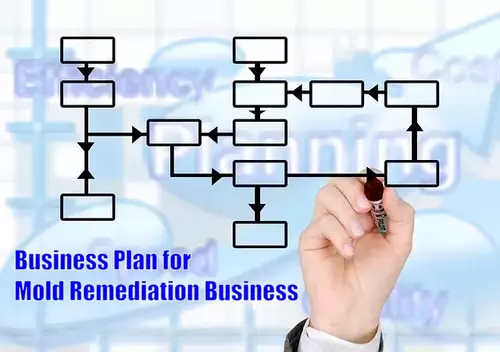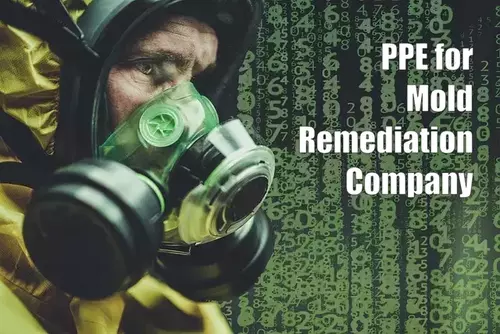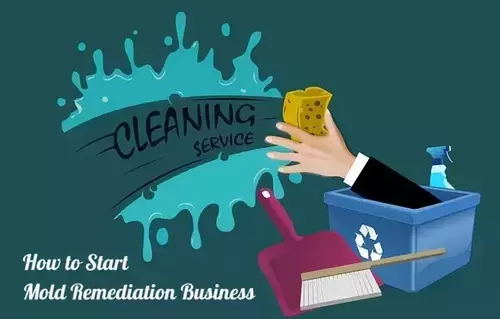The need for mold remediation is a hot topic almost all over the United States, so the need for firms that rid people of this contagion is high. Opening a business in this niche is a smart idea that, of course, requires a competent approach.
Starting a mold remediation business can be a lucrative venture. Mold remediation is the process of removing mold from a home or business. It is a specialized service that requires knowledge and experience to do correctly. This article will provide an overview of the steps necessary to start a successful mold remediation business.
Other articles related to starting a business:
Researching the mold remediation market
Before making an investment in the mold remediation business, it’s critical to comprehend the market’s dynamics.
Step 1: Identify Your Target Market
Finding your target market is the first stage in conducting market research on mold remediation. Think about the kinds of clients, the areas you want to serve, and the kinds of services you want to provide. This will assist you in focusing on the most pertinent facts and in limiting your investigation.
Step 2: Research the Competition
After determining your target market, it’s time to investigate your competitors. Look at the services they provide, the cost, and the feedback from previous clients. This will help you understand your competition and what you must do to distinguish out.
Step 3: Analyze the Market
The moment has come to do a market analysis after determining your target market and studying the competition. Consider the market’s size, expansion pace, and potential for further expansion. This will enable you to decide whether the market is worthwhile for investment.
Step 4: Develop a Business Plan
After conducting a market analysis, it’s time to create a business plan. This should have a thorough breakdown of your offerings, costs, marketing plan, and financial projections. This will enable you to decide whether the company is viable and worthwhile of your investment.
Step 5: Monitor the Market
Finally, it’s critical to continuously keep an eye on the market. You’ll be able to stay current on market trends and developments thanks to this. Additionally, it will assist you in finding chances to enhance your offerings and keep up with the competition.
Establishing a business plan
Any firm needs a business plan, but one for a mold remediation company is particularly crucial. A business plan will assist you in defining your objectives, spotting potential dangers, and laying out a successful strategy.
Define your goals

Defining your goals is the first step in writing a business strategy. What do you hope to accomplish with your company? Do you want to target business clients, or do you want to offer mold remediation services to homeowners? Do you intend to grow your company in the future? By providing answers to these inquiries, you can develop a plan that is customized to your unique requirements.
Identify potential risks
Once your objectives have been decided upon, it is critical to identify any potential hazards. Mold cleanup is a complicated process with numerous possible concerns. The possibility of health concerns, monetary losses, and legal penalties must all be taken into account. Possibile risks can be identified, and a plan can be made to reduce them.
Create a Roadmap for Success
Once potential hazards have been identified, it is necessary to develop a road map for success. This road map needs to have a debut date timeline, a budget for startup expenses, and a marketing strategy. It’s crucial to think about the tools you’ll require for success. This can entail recruiting personnel, investing in equipment, and earning certifications.
Securing initial capital
Depending on the size and scope of the company, different mold treatment businesses require different startup expenses. However, there are some fundamental costs that every firm must take into account. These consist of:
- Equipment: Specialized tools like air scrubbers, HEPA vacuums, and containment systems are needed for mold cleanup. The price of equipment might vary from a few hundred dollars to several thousand dollars depending on the size of the firm.
- Licensing: You could require a license to run a mold treatment firm, depending on your state.
- Personnel. If you are on a tight budget and you are going to perform many of the functions yourself, then you only need a few people who can either work for you or be your contractors (for example, laboratory staff or a cleaning company). So here you can pay for the work you do, which will be included in the payment for the order you execute.
- Training: It’s crucial to have a solid grasp of safety procedures and mold treatment methods. To make sure you are adequately equipped, you might need to spend money on training programs or certificates.
- Advertising: For your firm to succeed, you will need to make marketing and advertising investments. This can involve setting up a website, placing advertisements in regional magazines, and going to networking gatherings.
Starting a mold removal company might cost anything from a few thousand and tens of thousands of dollars. The precise cost will be determined by the business’s size and scope, as well as by the required tools and training. It’s crucial to keep in mind that beginning a business costs money, but that this money is an investment in your future. You can succeed in running a successful mold remediation company if you put the necessary effort and planning into it.
See also: How people remove mold in their homes on their own.
Choosing a location
Before settling on a location, it’s crucial to complete your research because the perfect location may make or break a business. Discover the elements to take into account while picking the ideal location for your mold removal company below.
The local market should be your top priority when deciding where to locate your mold cleanup company. To ascertain whether there is a need for your services, you should conduct some local market research. Consider the neighborhood’s population, the age of the homes, and the weather. Mold issues are more likely to occur in older homes in humid climates.
The local competition is something else you should think about. If there are already a lot of mold removal companies in the region, you might want to consider choosing a different area.
Accessibility is a crucial consideration when picking a location for your mold remediation service. Make sure that customers can readily access your services and that your firm is accessible. Make sure your company is situated close to a busy roadway by taking into account the nearby roads and highways.
Registering the business
A fantastic way to earn money and assist people with an issue that might be challenging to handle is to launch a mold treatment business in the USA. To ensure that your company is legally registered and in compliance with state and federal laws, there are a few steps you must take. Here is a step-by-step instruction manual for registering your mold removal company in the USA.
Step 1: Research local regulations
Investigating local laws in your location is the first step in registering your mold cleanup company. It’s crucial to know the rules in your region because every state has different standards and restrictions for businesses. Additionally, you should look into any regional licensing requirements as well as any unique licenses or certificates you might need to run your company.
See also:
- https://www.usa.gov/start-business
- https://www.forbes.com/advisor/business/small-business-legal-requirements/
Step 2: Choose a Business Structure
You must choose a business structure after doing your research on the local laws. Sole proprietorships, partnerships, limited liability companies (LLCs), and corporations are the most typical company types for mold remediation enterprises. Before making a choice, it is vital to consider all available structures because each one has pros and cons of its own.
Step 3: Register Your Business
You must register your business with the state after deciding on a business structure. Typically, this procedure entails submitting documents to the Secretary of State along with a fee. You might also need to register with the neighborhood county or municipality, depending on the state.
Step 4: Obtain Licenses and Permits
You must register your firm as well as acquire any essential licenses and permissions. A company license, a contractor’s license, and any other particular permissions or certificates demanded by your state may fall under this category.
Purchasing equipment
You must make sure you have the necessary tools before you can begin. The basic tools you’ll require to operate a successful mold removal business are listed below.
1. Personal Protective Equipment (PPE):

Any mold removal task requires personal safety equipment. Items like respirators, gloves, goggles, and coveralls fall under this category. These tools will assist in defending you and your staff against any potential health risks posed by mold.
2. Air Purifiers:
Air purifiers are necessary for any mold removal project. They help to eliminate mold spores from the air, which can help lower the risk of mold-related health disorders.
3. Dehumidifiers:
By lowering the humidity in a space, dehumidifiers can aid in limiting the formation of mold.
4. HEPA Vacuums:
HEPA vacuums are made to pull in tiny particles from the air, like mold spores. This can lessen the chance of developing mold-related health problems.
5. Mold Test Kits:
To check for the presence of mold in a location, mold test kits are employed. This can assist you in determining the severity of the mold issue and the most effective cleanup strategy.
6. Disinfectants:
Mold spores are eliminated by disinfectants, which also stop them from proliferating.
7. Containment Equipment:
To establish a wall between the contaminated area and the rest of the house or business, containment equipment is used. Mold spores may not spread as a result of this.
You can make sure that your mold remediation business is effective by having the appropriate tools. Make sure to spend money on durable tools that will enable you to complete the task successfully.
Conclusion
Starting a mold remediation business can be a rewarding venture. By following the steps outlined in this article, you can start your own successful mold remediation business.








